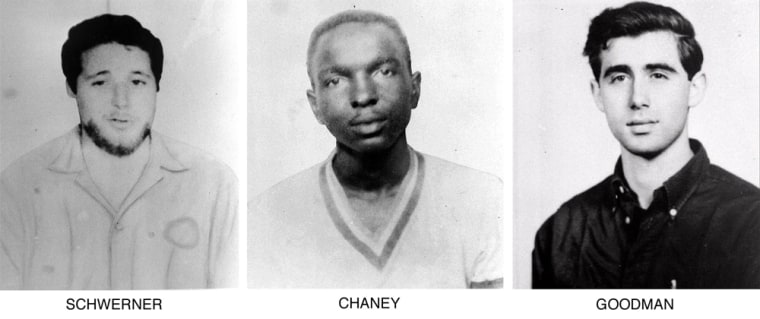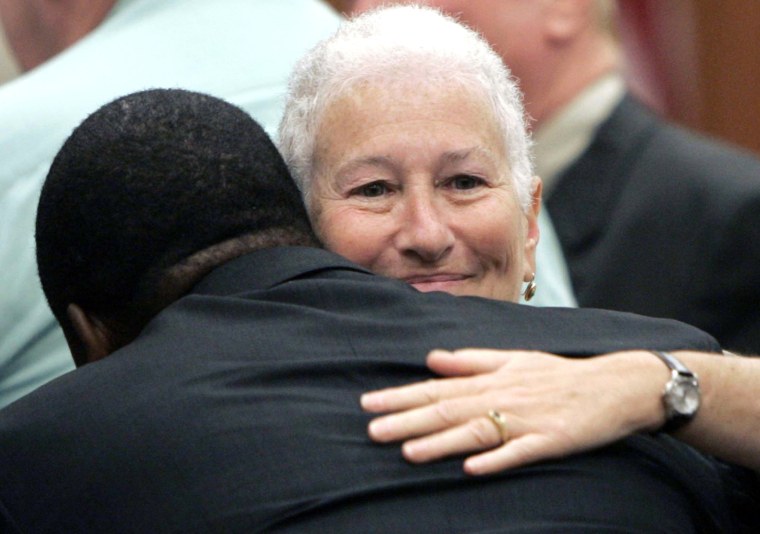PHILADELPHIA, Miss. — Closing a painful chapter of the civil rights era on Tuesday, a jury convicted Edgar Ray Killen, 80, of manslaughter in the deaths of the three young civil rights workers — Michael Schwerner, 24, James Chaney, 21, and Andrew Goodman, 20 — whose disappearance 41 years ago gripped the nation and ushered in landmark legislation.
A day later, NBC News’ Mark Potter reports on the mood in the town of Philadelphia.
What is the sentiment on Wednesday now that Edgar Ray Killen has been convicted of manslaughter in connection with the 1964 slaying of three civil rights workers?
There is a sense that justice was done and also a sense of relief that it worked out. People are glad that the trial is over, they are glad that there was a verdict.
A mistrial could have been as disastrous as an acquittal for the reputation of the town of Philadelphia.
So, because there was a conviction — most people in town seem to be breathing a sigh of relief. That they can get on with business, get on with going forward, and maybe casting aside finally the national spotlight.
Killen was the one guy who was seen by law enforcement officials as the mastermind, and the one who organized the killings. And, yet, he was the one who got away in 1967.
He was nearly convicted by a vote of 11 to one, but there was one hold out who said that she refused to convict a preacher. He was a Klan leader, a part-time preacher, and a sawmill owner. Because he was a minister, one juror refused to convict him. So, all this time, he was out there. He escaped conviction all those years ago, but finally it happened.
I asked one man I talked to, an African-American, what he thought of the verdict. He told me he was glad that the verdict finally came. But, that he was sorry that Edgar Ray Killen had 41 years of freedom after the three civil rights workers were killed. He thought that was way too long for justice to be done.
Is there a sense of disappointment that Killen was only convicted of manslaughter and not murder?
I don’t think there is widespread disappointment in that.
I think there is actually relief that there was a verdict at all and a conviction. I don’t think that the details of the conviction matter that much, just that there was one.
I truly think that there is a sense of relief that this case has been heard by a local jury and that a decision has been made, so to that finally this town can put this case behind it.
Philadelphia, Mississippi and Neshoba County have carried the horror of this case for 41 years. There have been many people in this area who have said that the only way to get beyond the ghost of 1964 is to bring this case to trial with state charges, a local jury, and a judgment by local residents. That has come now and given that, I think there is a sense of relief.
There is a belief that the voices of the three victims, the three civil rights workers, had finally been heard, and that the town had finally done something about it, on its own.
It was a hometown answer to an event that occurred nearby. I think that there is a sense of pride in that, and also a feeling that maybe this will finally allow the town to move forward, away from this violent chapter in Mississippi’s history.
Does it seem that the town is really determined to shake its bad reputation, so to speak?
I think so. People from the newspaper and in the business community have long talked about this. So many people here have long said that there is much more to this town than just this one story. There is more to Philadelphia than “Mississippi Burning.”
But, it is the only thing that many people know about Philadelphia, Miss. Some of the folks who we were talking to yesterday said that they hoped that people would notice that they were the ones who finally came up with this response — a hometown verdict.
One point that does need to be made, however, is that there is a split of opinion in the area. Some people felt that this perhaps should have just been allowed to go away, without being resurrected again. [They were] thinking that there was no percentage in resurrecting the events of 41 years ago, just let it die, let it end.
Others said, that’s not the right approach. You have to address this, you have to do something about it actively. And those people seem to have won out and seem satisfied with the results.
Now, for those naysayers of the trial, was there anger over the manslaughter conviction?
Some people are angry that there was a conviction at all and some people are angry that it was only a manslaughter conviction. But, they probably are in the minority, on both counts.
Overall, I think that there is a feeling that it doesn’t matter what the conviction was — just the fact that there was a trial, and a verdict, and a conviction of some sort.

If you think about it, in terms of sentencing, in the case of an 80-year-old defendant, it doesn’t matter whether the maximum sentence is life in prison, which it would be for murder, or 20 years per count, as it is with manslaughter. In effect, any sentence of any length could be a life sentence given the age of Mr. Killen.
Are some people saying that still more needs to be done to wrap up this tragic chapter in the town’s history?
Some of the victims' family members are saying that this should be a beginning and not the end. They are hoping that others perhaps can be tried by state.
However, that seems unlikely. The State Attorney General, Jim Hood, told me that this is probably the first and last case that the state of Mississippi is going to bring in connection with the 1964 killings.
Hood said that officials took several other names before the grand jury, for consideration of charges, and the grand jury refused to indict any of them. They choose only to bring charges against Edgar Ray Killen. So, it seems unlikely that we will see other people charged by the state of Mississippi.
How important is it that this case was tried at this time, when so many other civil-rights-era crimes are being revisited throughout the country?
A lot of people say that this is very important. Many say that murder has no statute of limitations and that the country and the state needed to do this. This is one of several cases that have been brought forth around the country and there may be more to come.
But, most of the people that we talked to felt that this was important to do and that they are glad that it’s over because now they can move forward.
So what’s next for Edgar Ray Killen?
Edgar Ray Killen is now in custody. Tomorrow morning he will go back to the Neshoba County courthouse to face the judge and he will be sentenced.
We have been told by state officials that he faces the possibility of three years to 60 years in prison. He was convicted on all three counts of manslaughter, and each of those counts carries a 20-year maximum, so he could be looking at some serious time.
Again, given his age, it’s quite possible that he could end up dying in prison.
